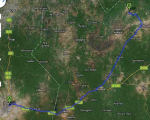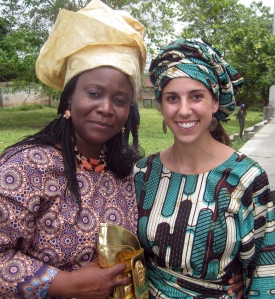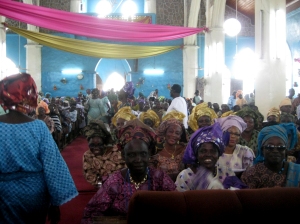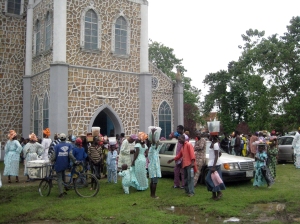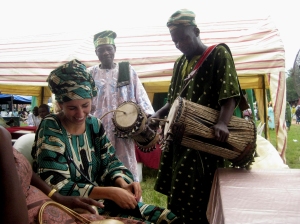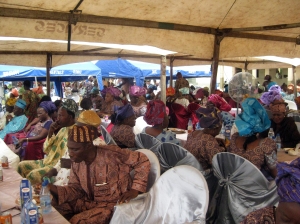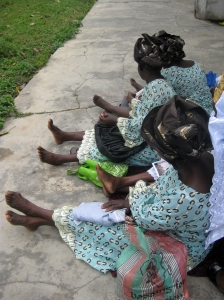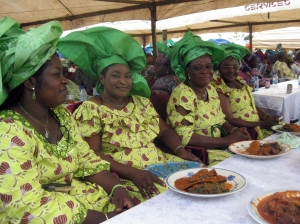Why do Nigerians do this? Kíló dé? What is the impetus for the brides parents to spend thousands of Naira making personalized clock radios, and the groom’s parents printing stickers to put on plastic fans all to give hundreds of guests at the wedding? Some people say Nigerians just love spending money. One of the names for celebrations like weddings, funerals, naming ceremonies is “ìnàwó” which literally means “money spending” in Yoruba. Others say everyone does it because everyone else does it, nítorí náà ó tí di baraku fun gbogbo omo Naijiriya lati na owó katikati fun àwon ebùn yìí. Maybe it’s because Nigerians go to so many parties in their life times that they need something useful, something they can use everyday for fetching water or writing notes to remind them of that wonderful “ìnàwó” they attended years back. If you are lucky enough to be be among the guests at a party where the celebrants are very wealthy, to lowó bajebaje, you might even get a Blackberry complete with the a picture of the newly wed’s faces on the back.
Posts Tagged ‘funeral’
Take this bucket as a thank you for attending my party
Posted in Cultural Events, The Little Things, Uncategorized, tagged funeral, inawo, Nigeria, party favors, wedding on April 12, 2011| 21 Comments »
A different kind of funeral
Posted in Blogstream, Travel Notes, tagged differences, funeral, party, Yoruba clothing on November 8, 2010| 16 Comments »
I finally got out of Ibadan this weekend. My host mom invited me to go with her to a funeral in Ilobu, a village in Osun State, about 100 km north east of Ibadan.
I was ecstatic at the idea of traveling to another part of Yorubaland, especially for a funeral. When an agbalagba (old person) dies, his/her children throw a huge celebration with lots of food, dance and music. A funeral for a person who lives a long life is cause for celebration here, not sadness. The burial ceremony for the late Chief Moses Ojo Anwo brought hundreds of people from all over Yorubaland to Ilobu to celebrate his “glorious exit” after 90 years of life.We were five in the car to Ilobu: my host mom in the drivers seat, the wife of my dad’s brother in the front seat, me in the back squished between my host grandmother and the wife of my dad’s other brother.
The road to Ilobu was in decent shape for the most part. You should expect to thrash from side to side on any road around here as the driver dodges pot holes. We stopped on the side of the road for 10 minutes when we noticed the temperature gauge on the car all the way up. I stood up outside the car, with my hands on the top to escape the heat inside the car and watch the heavy traffic pass around a semi-truck stuck in the mud. Wearing my traditional Yoruba dress, I attracted a lot of attention from drivers. It probably didn’t help that I was yelling “Good afternoon,” and “greetings for taking a trip” at drivers in Yoruba. A driver kept his eyes on me for so long, in complete shock at this Oyinbo woman dressed like a Yoruba and speaking Yoruba, that he lightly crashed into the car in front of him. The police man helping us tend the overheating car just laughed at this and the whole incident dissolved without a single argument or exchange of insurance information.We arrived at the church in Ilobu just in time to miss most of the service. Every pew was completely full, so without space to sit we stood outside taking pictures and scrutinizing all the different traditional outfits.
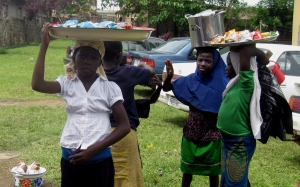
Young girls hold their markets on their heads to sell to guests looking for something sweet or refreshing.
After the service, all the guests drove a ways down the main road to a big field for the reception. Empty plastic tables and chairs arranged neatly under big tents covered the perimeter of the field and two band tents with huge speakers situated in the middle. Anwo, the man who died, had one wife with many children so different children sponsored a different band tent, conveniently located right next to each other, speakers facing the same way. The sound was horrifically loud. When we arrived drummers playing the talking drum swarmed me and started drumming the tune of “O-yin-bo” to amuse me and earn some naira.
Three of them followed me all the way to my table, until finally after a lot of drumming my ear drums had had enough and I gave one 50 Naira. He promptly left my side. The caterers served us a choice of rice, moinmoin and beef or pounded yam with stew. I chose the pounded yam as it is becoming one of my favorite foods here. After eating, the lead musician invited the celebrants (the children of the deceased) to come and dance on the dance ground where their friends started spraying them with money. I wish I had pictures of this now, but it will have to wait for a later post. Basically people drop money, mostly small bills, on your face and all over you while you dance. Meanwhile someone collects the money from the ground in a bag for you. When I hear music it’s hard for me to stand still. I started grooving in my chair a little bit when my mom told me to stand up and dance. I did and she sprayed me with 100 Naira. All eyes of the guests seated under the tent were on me again. I must say, I can dance like a Nigerian woman pretty well. I have the arm/butt coordination down pat. Before long a man from the dancing crowd approached me to bring me into the crowd. My mom and grandmother encouraged me to go so I danced into the crowd of celebrants and within no time women and men started spraying me with Naira. I must have danced for no more than 2 minutes and I came out with 2,400 Naira, about $15. A couple women even sprayed me with 500 N bills, very rare for spraying! I am kicking myself now for not dancing longer.So goes a typical funeral for a person who lived a long, fulfilled life in Yorubaland. Not one person at the event wore a black suit or a black dress. In fact, observing the clothes was one of the most incredible parts of the day for me.
Each cloth is beautiful and bright, and of course an outfit is not complete without a gele or fila on top. Women wrap stiff geles that complement their clothing perfectly and the man’s fila sits proudly on his head, dropped to one side depending on if he is married or not. Then you see the “aso ebi” or family clothing. At big parties like weddings or funerals, families-men and women-will all dress in the same cloth. It will all be sewn in different styles but it is totally coordinated and is a stunning sight to see. Dressing is such a beautiful part of the Yoruba culture, I could never be bored at a party just for examining all the different clothing styles.I am coming to love this country and culture more and more after every day that goes by, especially with every new Yoruba outfit I get back from the tailor. I may just come home with an entirely new wardrobe.

